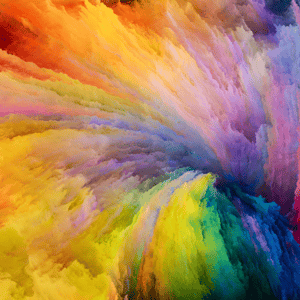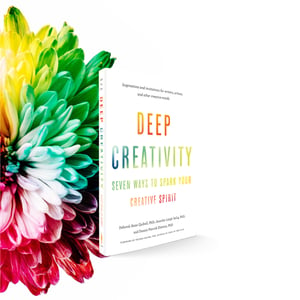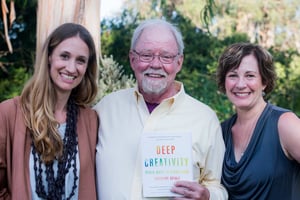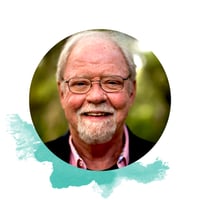 An Interview with Dennis Slattery, Ph.D.
An Interview with Dennis Slattery, Ph.D.
by Angela Borda
Dennis Slattery is a beloved professor emeritus of mythology at Pacifica, with over fifty years of teaching experience and 30+ books published, along with seven books of poetry. He is the co-author of Deep Creativity: Seven Ways to Spark Your Creative Spirit and will be co-presenting the Pacifica workshop of the same name with Pacifica scholars Deborah Anne Quibell, Ph.D., and Jennifer Leigh Selig, Ph.D., on March 5–7, 2021. Visit us for more information here. I felt very privileged to discuss Dennis’s work with him, as he is deeply thoughtful about the liminal realm of imagination and creativity within the context of mythology and depth psychology.
Angela: How does mythology intersect with creativity?
Dennis: Intersect is the right verb to use. The last volume of J. Campbell’s four-part Masks of God is entitled “Creative Mythology.” Myths themselves are creative expressions of the individual/communal soul. The call to create is a call to uncover the myth that is our own, and which communes with other souls. Both require a belief in the invisible forces at work in the world. I think that the unconscious is a creative terrain from which many of our inspirations spring.
Creating is a form of mythologizing ourselves further and becoming more conscious of what that feels like. Creative inspiration comes, in part, from the myth within that we are each living out. Creative expressions fuel that growing awareness.
Angela: How does creativity speak to answering the question of who we are and why we are? Is that at the heart of Deep Creativity, some deeper understanding of why we need to express ourselves? How does the importance or meaning of creative expression shift when it becomes a communal project?
Dennis: Creativity addresses and promotes our identities, shows their gaps, and allows us to continue to story ourselves into being. So creativity has an ontological element in that it is interested in our being as well as our becoming. The stories that we tell ourselves and those that we hear or read are often moments of awakening to our deep creative impulses. When I and my co-authors, Jennifer and Deborah, gathered in a shared communal effort and willingness to learn from one another, we energized one another, saw the same WAY that we wrote on from others’ standpoints and witnessed the creative genius of each of us. Deborah led the construction of the book with her breathing in/breathing out meditations at the beginning and end of each of the 7 Ways. That alone helped Jennifer and me to align our creative energies with this ritual practice. I for one, would not have thought to construct such framing.
 Angela: You are a poet, a painter, a potter, really quite prolific in all that you’ve published. How have you continually renewed your artistic flame and is that represented in the principles present in the book Deep Creativity?
Angela: You are a poet, a painter, a potter, really quite prolific in all that you’ve published. How have you continually renewed your artistic flame and is that represented in the principles present in the book Deep Creativity?
Dennis: I have continued to renew and keep lit my artistic flame by remaining curious, interested and listening to what comes along that makes me wonder, want to know more. It is also self-trust—that I am guided by a desire to know who and what I am on this planet and to share with others what I learn. Like this interview. I was so excited to be asked to be part of the trilogy to create Deep Creativity; it came at the right time, the moment of Kairos, or auspicious time, for I had become interested in what creativity does to inform and form the soul in each of us. I thought I could understand much more by working with two creative geniuses that would open up pathways of knowing I could not do by myself.
Deep Creativity is participatory, responsive, archetypal, and alchemical, so yes, my own principles of creative renewal are present in the book.
Angela: Quarantine affected creative people differently. Some dug in and wrote that book they’d been meaning to write. Others have found themselves unable to write or paint or create music during this time, have found it to be a time of paralysis or inability to express. What is your perspective on this from the angle of depth psychology and will the workshop address periods of the apparently fallow, how to emerge from that and evolve from it into a place of deep creativity?
Dennis: The virus and quarantine have required enormous creative adjustments: to routine, to familiarity, to being present with others, to life in an embodied way. But it has suffocated some, especially those whose supported life has been curtailed. Of course, it can lead to periods of inactivity, of lack of creative energy.
The psyche has its own reality, its own impulses, desires. Can I be attentive to that reality in a new, even creative way? Is not being creative also part of the aesthetic hero’s journey, where pauses, gaps, end-stops are part of the pilgrimage? Can I pay more attention to my dream life during this period, to follow the narratives/images that emerge from this lower depth that informs my conscious life? This will be part of the workshop we present. I may pay more attention as well in these periods of lesser creative urges, although they may be taking new forms that we have not yet noticed. We can learn much from moments of blockage and resistances, as I have written in one of my essays. Deb and Jennifer also address these moments of resistance—a good place to ask if the resistance is trying to lead me onto another path, finally more fruitful. Trust, again, is the key to being willing to yield to these pauses in our creative life.
Angela: You teach a section of the workshop centered around viewing our lives as our canvases, as something that can be created and co-created. How do you hope participants will learn from this and be transformed by it? Does a participant need to be an artist to benefit from this or can anyone, even those who have never picked up a paint brush, find significance and growth and gratification in thinking of their life as a creative process?
 Dennis: Life as a canvas is a rich metaphor, not to be taken too literally. Every morning when I write early in my journal, for example, I am adding to the painting in prose of my life’s contours, aspirations, disappointments, and projects. Some days feel like quick brush strokes; others feel like it is taking forever to sketch out in rough outline where I am supposed to put my energies now. And watch especially for presences from outside that come in the form of an invitation, an idea that stems from something seen, read, heard, overheard—all these have the capacity to add to and modify the canvas of life from unlived to lived. These are potentials, perhaps new insights to add to the canvas of coherence, of comprehension and finally to what we are called to accept.
Dennis: Life as a canvas is a rich metaphor, not to be taken too literally. Every morning when I write early in my journal, for example, I am adding to the painting in prose of my life’s contours, aspirations, disappointments, and projects. Some days feel like quick brush strokes; others feel like it is taking forever to sketch out in rough outline where I am supposed to put my energies now. And watch especially for presences from outside that come in the form of an invitation, an idea that stems from something seen, read, heard, overheard—all these have the capacity to add to and modify the canvas of life from unlived to lived. These are potentials, perhaps new insights to add to the canvas of coherence, of comprehension and finally to what we are called to accept.
I like that you use the word “co-created.” I think anything we create is in some format a co-creation, from sources within us and influences outside of us. Co-creation is a form of co-hearing, a “hearing with.” A “seeing with.” I picked up a paint brush after over 58 years of not drawing, coloring, or painting anything; and it came in the form of an invitation from a former student who had established herself as a fine acrylic painter of Texas wildflowers and other beauties in nature. Her invitation came when I was taking my grand daughter to a painting class for young folks. I have been picking up a paint brush now for nine years. But I have been picking up a pen for decades; that has been my print brush, my writing brush. We each paint ourselves daily through the stories we tell and those we hear or read. Sometimes, without knowing it right away, we can paint ourselves into a corner; we can paint ourselves into a new creative space; we can paint ourselves into a new way of seeing how ordinary moments in each day are grounds for the creative spirit to work with.
If one has never tried actual literal painting, now might be the time to let that part of one’s mysterious myth have expression, or making pottery. But it can be waking up each morning to see the possibilities of what the day might allow one to begin or continue painting.
Angela: Thank you so much for speaking with me, Dennis. I’m looking forward to your March workshop with Deborah and Jennifer on Deep Creativity and all your future endeavors.
The Deep Creativity: Invoking and Inspiring Your Creative Soul event is taking place March 2021. For more information and to register, visit our website https://retreat.pacifica.edu/deep-creativity/
 Dennis Patrick Slattery, Ph.D. has been teaching for 51 years, the last 26 in Mythological Studies at Pacifica Graduate Institute in Carpinteria, California. He has authored, co-authored, edited or co-edited 30 volumes, including one co-authored novel with Charles Asher and 7 volumes of poetry. He has also published over 200 articles in journals, books, magazines, newspapers and on-line venues. At one point he took pottery classes where he taught at a Catholic university in San Antonio, Texas. He has for the past 8 years taken painting classes in acrylic and watercolor with a former student, now a professional artist. In the last four years he has been writing regular Op-Ed pieces for newspapers in New Braunfels, Texas and San Antonio, Texas. He has also enjoyed immensely collaborating with both Deborah Anne Quibell and Jennifer Leigh Selig on Deep Creativity: Seven Ways to Spark Your Creative Spirit. He believes, with them, that the spirit of creativity lives deeply in all of us. Courage and coaxing are often enough to witness it flower in individuals. When not writing or teaching, he enjoys riding his Harley Davidson motorcycle with his sons, Matt and Steve, through the Texas Hill Country. http://www.dennispatrickslattery.com/
Dennis Patrick Slattery, Ph.D. has been teaching for 51 years, the last 26 in Mythological Studies at Pacifica Graduate Institute in Carpinteria, California. He has authored, co-authored, edited or co-edited 30 volumes, including one co-authored novel with Charles Asher and 7 volumes of poetry. He has also published over 200 articles in journals, books, magazines, newspapers and on-line venues. At one point he took pottery classes where he taught at a Catholic university in San Antonio, Texas. He has for the past 8 years taken painting classes in acrylic and watercolor with a former student, now a professional artist. In the last four years he has been writing regular Op-Ed pieces for newspapers in New Braunfels, Texas and San Antonio, Texas. He has also enjoyed immensely collaborating with both Deborah Anne Quibell and Jennifer Leigh Selig on Deep Creativity: Seven Ways to Spark Your Creative Spirit. He believes, with them, that the spirit of creativity lives deeply in all of us. Courage and coaxing are often enough to witness it flower in individuals. When not writing or teaching, he enjoys riding his Harley Davidson motorcycle with his sons, Matt and Steve, through the Texas Hill Country. http://www.dennispatrickslattery.com/



